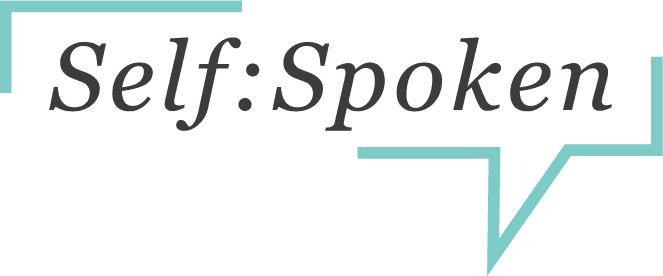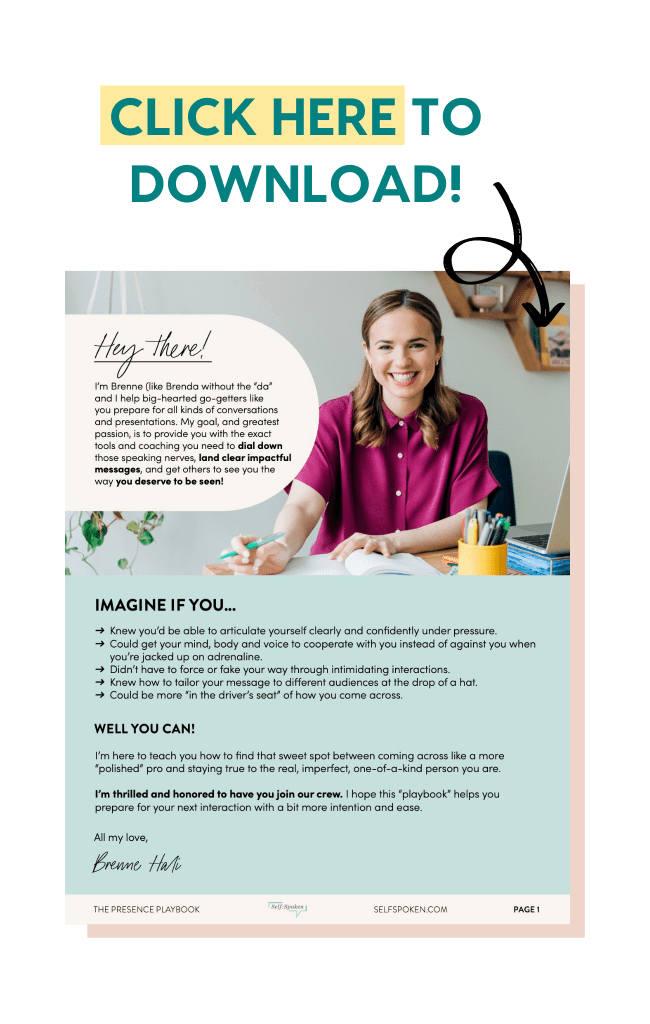“I’ve been preparing for this moment for a while now… I’ve done everything I can, and I’m ready to show up and do my best. But now that it’s here, I’m starting to feel nervous!
How can I shake these jitters? I KNOW I’ve got this, but how do I prove that to my body and my brain so I can stay grounded in the moment and really engage my audience?!”
If these thoughts have ever raced through your head, first of all: welcome to the human family!

We ALL experience some level of nervousness when we know we’re about to be the center of attention. It doesn’t matter how much you’ve prepared, or how confident you are when talking to people in the rest of your life.
In fact, if you WEREN’T feeling nervous before a big interview or presentation, I’d be worried about ya. Physiologically, we’re built to go into fight or flight mode when all eyes are on us. So getting the jitters isn’t a bad thing… it’s a natural thing. But that doesn’t mean it’s fun!
So what can you do to dial down nerves next time they come up for you?
3 science-backed strategies for managing nervousness:
1. Take up space.
When our limbic brains are in that fight or flight mode, we often have the urge to *get smaller*. Literally. We shrink our posture and clasp our hands to make ourselves less of a target, and to self-protect.
If you think about it from an evolutionary standpoint, it makes sense, doesn’t it? If you were being chased by a lion in the jungle, you’d want to run until you could duck behind something and hide.
Outside the jungle, when you feel that adrenaline rushing in, your body tends to look for it’s own “hiding posture”—without you even realizing it.
Which is why it’s so important to expand your posture on purpose. You want to get bigger, both literally and figuratively.
Just by imagining yourself filling the space around you, you send an important neurobiological message to your body that you’re not in danger. That, in fact, you have enough power in whatever situation you’re in to take up space, and not run or hide. Here are some of my favorite ways to take up space instead of *shrink* under pressure:
✔️ Strike a power pose.
First made famous in Amy Cuddy’s TED Talk on body language, power posing is a surefire way to imbue more confidence when you feel the jitters creeping up. It’s simple: before the event, strike your power pose for at least two minutes. It should be something that makes you feel capable and confident. The most popular power pose? Stand like Wonder Woman: chin high, shoulders back, hands on your hips, feet planted wide. I personally prefer to lift my arms in the sky like I just won a race. I find that when I do this for even 30 seconds, I feel more energized and excited than nervous.
✔️ Visualize your confidence.
Scientific studies have shown that just visualizing something can change brainwave activity and the way we perceive reality. My mentor, Cara, taught me a handy method for lifting myself into a greater state of confidence before a big event: I visualize myself glowing—imagining a light pouring out of every cell in my body, filling up whatever room I’m in. Try this method or another form of visualization next time you’re nervous to ease those jitters!
2. Release tension.
When you’re nervous or uncomfortable, you tend to tense your muscles as a measure of self-protection. But all this does is reinforce the parts of your brain in fight or flight mode, keeping your anxiety levels high. These two techniques will send a signal to your limbic brain that you don’t need to tense up and self-protect, you can release and be present instead:
✔️ Do a body scan.
Tune into the tension you’re holding with a body scan. Close your eyes before bringing awareness to each part of your body. Scan all the way from the top of your head to the bottom of your feet, paying special attention to tense spots like your shoulders, neck, eyes, and stomach. As you scan each section, release any tension you feel there.
✔️ Monitor your breath.
We tend to take shallow breaths from our chests when we’re nervous. So next time you feel jitters, evaluate your breathing! If you notice you’re breathing from your chest, relax your belly and focus on inhaling and exhaling from the abdomen. It’ll release tension from your midsection and help to lower your heart rate, too.
3. Pay attention to others.
The more you focus on caring for the people you’re speaking to, the less brain space you’ll have left over to focus on how YOU’RE doing. Plus, when all your energy is focused on making your audience feel energized, welcomed, and cared for, the more fulfilled and connected you’ll feel in the moment. Here are two ways to do just that:
✔️ Flip your focus.
Instead of worrying about putting yourself at ease, focus on putting OTHERS at ease. With your attention pointing toward making someone else feel comfortable, calm, and confident, you’ll naturally embody these qualities as you speak. It’ll leave everyone feeling less nervous and more connected.
✔️ Speak with intention..
If you approach a nerve-wracking situation with the singular intention not to “screw up,” your communication style will reflect that. You’ll seem more nervous or unsure of yourself. But if you can sharpen your intention, so that it’s a clear and empowering one… not only will you feel more clear-headed and empowered heading in, you’ll be more effective throughout! And when I say intention, I mean a simple phrase that represents how you want your audience to feel. For me, it’s usually some form of: “I see you, I’m here for you,” to make whomever I‘m speaking to feel seen and supported. When I use this intentional filter, it becomes the subtext of what I’m saying and it oozes into my tone and my overall energy. This helps me communicate more clearly and effectively and it keeps me out of my head!
The bottom line?
Getting the jitters just means your limbic brain is trying to protect you from an old, primal understanding of danger (i.e, putting yourself out there).
So, if you want to continue putting yourself out there (please do! we need your voice more than ever), and you don’t want those jitters getting the best of you, use these three strategies to show up with more calm and confidence from the inside out.
It takes practice, but I promise that with some repetition, you’ll have a whole new appreciation and a more intimate pulse on your own nervous system.
Could you use more tips like these for speaking with authentic confidence under pressure?
Let me send you my Presence Playbook—it was designed to help you do just that!
Inside, you’ll learn go-to frameworks and strategies to help you…
- Articulate yourself clearly and confidently under pressure
- Get your mind, body and voice to cooperate with you instead of against you
- Stop faking or performing your way through intimidating interactions
- Tailor your message to different audiences at the drop of a hat
- Be more “in the driver’s seat” of how you come across to others
And remember: these are learnable skills, not innate talents. And I’ll warn you—while these skills are super practical and effective, they won’t do anything for you if you’re not practicing regularly.
I personally use SelfSpoken techniques every day to turn panic into power and pressure into presence. And I rely on trustworthy accountability partners who remind me of my goals and push me to stretch. Because as we evolve, we need safe spaces to build self-awareness and expand our skills beyond what we thought was possible on our own.
So if you’re the kind of person who’d benefit from practicing with a coach and intimate community of like-hearted, go-getters, check out The Confident Communicator!
It’s a course and community where you’ll be supported as you step into the next level of your skills. Because when it comes to showing up as the you, you most want to be, it may be a personal journey, but you don’t need to go it alone!
We’re here to support you and challenge you, and I can’t wait to watch you rise.


Why You Rush, Ramble, or Freeze When Speaking—And How to Find Your Voice Under Pressure
Ever walked out of a high-stakes meeting or presentation thinking, “Why did I say all that?” Or worse—“Why didn’t I say anything at all?”…
On a recent coaching call, someone raised the question of how to be more direct in your communication without making others uncomfortable… The truth?…
Do you ever get frustrated when you find yourself not speaking up in meetings or missing opportunities due to fear of not saying the…




